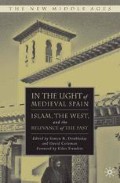Abstract
In popular culture, al-Andalus is nostalgically represented as a paradise of tolerant coexistence. Many novels, films, and popular histories depict Muslims, Jews, and Christians living together in harmony and prosperity; as a logical consequence, what destroyed alAndalus was intolerance, be it Muslim as in Youssef Chahine’s film Al-Massir (Destiny) or Christian as in Salman Rushdie’s novel The Moor’s Last Sigh. In these depictions, al-Andalus represents the ideal lost homeland, the place where almost everyone could have lived free from violence and discrimination because of ethnicity, religion, or political allegiance. Significantly, many of those who promote this idealized image of al-Andalus have suffered persecution, violence, and/or exile. Imaginatively inhabiting al-Andalus in their writing or filmmaking is a way to make a home for themselves to replace the one that has rejected them. Idealizing depictions of Andalusian coexistence enable their authors to explore possibilities for making the real world a more survivable place and/or for remaking the self in order to be more able to survive exile. Such depictions fuse history and fantasy to produce a credible Otherworld that mirrors this one and other selves who have survived and to some extent overcome the fragmentation of exile.1
Access this chapter
Tax calculation will be finalised at checkout
Purchases are for personal use only
Preview
Unable to display preview. Download preview PDF.
Notes
In these comments I draw upon John C. Hawley, “Colonizing the Mind: ‘Leo Africanus’ in the Renaissance and Today,” Colonial and Postcolonial Incarceration, ed. Graeme Harper ( New York: Continuum, 2001 ), pp. 53–66.
Edward W. Said, “Reflections on Exile,” Reflections on Exile and Other Essays (Cambridge, MA: Harvard University Press, 2000), p. 173 (173–186);
André Aciman, “Permanent Transients,” Letters of Transit: Reflections on Exile, Identity, Language, and Loss, ed. André Aciman (New York: New Press, 1999), p. 10 (7–14).
Sebastiaan Faber, Exile and Cultural Hegemony: Spanish Intellectuals in Mexico, 1939–1975 (Nashville, TE: Vanderbilt University Press, 2002), pp. 7, 195–197.
José Luis Abellán, De la guerra civil al exilio republicano (1936–1977) (Madrid: Mezquita, 1983), pp. 113, 132–136, also discusses how Castro’s experience of exile affected his historiography.
Rachid Nini, Diario de un ilegal, trans. Gonzalo Fernández Parilla ( Madrid: Ediciones del oriente y del mediterráneo, 2002 ).
Amin Maalouf, Léon l’Africain ( Paris: Jean-Claude Lattés, 1986 ); English translations from Leo Africanus, trans. Peter Sluglett (Chicago, IL: New Amsterdam, 1992).
María Rosa Menocal, The Ornament of the World: How Muslims, Jews, and Christians Created a Culture of Tolerance in Medieval Spain (Boston, MA: Little, Brown, 2002 ).
Natalie Zemon Davis, Trickster Travels: A Sixteenth-Century Muslim between Worlds (New York: Hill and Wang, 2006); she discusses his tale of the amphibian bird (pp. 110–111). After his baptism and renaming as Joannes Leo, al-Hasan signed his name in Arabic Yuhanna al-Asad, “John the Lion” (p. 65).
Kwame Anthony Appiah, Cosmopolitanism: Ethics in a World of Strangers ( London: Allen Lane/Penguin, 2006 ), pp. 1–8.
Editor information
Copyright information
© 2008 Simon R. Doubleday and David Coleman
About this chapter
Cite this chapter
Filios, D.K. (2008). Expulsion From Paradise: Exiled Intellectuals and Andalusian Tolerance. In: Doubleday, S.R., Coleman, D. (eds) In the Light of Medieval Spain. The New Middle Ages. Palgrave Macmillan, New York. https://doi.org/10.1057/9780230614086_5
Download citation
DOI: https://doi.org/10.1057/9780230614086_5
Publisher Name: Palgrave Macmillan, New York
Print ISBN: 978-1-349-53940-6
Online ISBN: 978-0-230-61408-6
eBook Packages: Palgrave Literature & Performing Arts CollectionLiterature, Cultural and Media Studies (R0)

